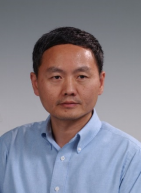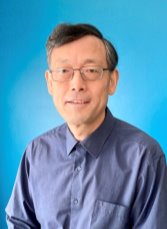
Professor Guoxiang Gu
Louisiana State University,IEEE Fellow
Biography
Guoxiang Gu received his Ph.D.degreein electricalengineering from University of Minnesota,Minneapolis,Minnesota in 1988. From 1988 to 1990, he was with the Department of ElectricalEngineering, Wright State University, Dayton, Ohio, as a VisitingAssistant Professor. Since 1990, he joined Louisiana State University (LSU), Baton Rouge, where he is currently a Professor of Electrical and Computer Engineering.
Professor Gu's research interests include networked control systems, modeling and system identification, and control applications. He has published two books, over 80 archive journal papers and numerous book chapters and over 100 conference papers. He has held visiting positions at Wright-Patterson Air Force Base and in Hong Kong University of Science and Technology. He served as an associate editor for the IEEE Transactions on Automatic Control from 1999 to 2001, and from 2018 to 2022, SIAM Journal on Control and Optimization from 2006 to 2009, and Automatica from 2006 to 2012. He is presently the F. Hugh Coughlin/CLECO Distinguished Professor of Electrical Engineering at LSU, and a Fellow of IEEE.
Title: Asymptotic Full Actuation Control with Applications to Control of Autonomous Vehicle Platoons
Abstract: The rise of the full actuation control represents a holistic approach to nonlinear feedback control systems. Motivated by the pioneering work of Duanin his series of papers, we study asymptotic full actuation control for a class of commonly seen nonlinear systems, involving unknown and uncertain parameters. We will present several results, including:
Proposal of innovative adaptive control laws that achieve both asymptotic stability and asymptotic output regulation for the uncertain nonlinear feedback system,
Asymptotic linearization for uncertain nonlinear systems, based on the proposed adaptive control laws and aided by secondary least-squares estimators,
Asymptotic string stability for control of autonomous vehicle platoons, achieving not only the velocity consensus but also the required spacing between the neighboring vehicles.
We will also present our views on future challenges to the full actuation control and how these challenges can be tackled in the near future.

Professor Xiaoping Liu
Lakehead University, Canada
Biaography
Xiaoping Liu received the B.Sc degree in automation in 1984. M.S. and Ph.D.degree in control theory and application in 1987 and 1989 from Northeastern University, P. R. China. He was with the School of Information Science and Engineering at Northeastern University, P. R. China from 1989 to 2000. In 2001, he joined the Department of Electrical Engineering, Lakehead University, Thunder Bay, ON, Canada. His research interests are nonlinear control systems and adaptive control. He has published more than 200 scientific journal papers. He is a member of the Professional Engineers of Ontario.
Title: Weak disturbance decoupling of high-order fully actuated nonlinear systems
Abstract: It is well known that all practical control systems are subject to external disturbances. Therefore, a feedback controller should be designed so that the closed-loop system has some desiredpropertiessuch as stability, good tracking performance, at the same time, the impact of external disturbances on the performance of the closed-loop system is attenuated to some degree.Onthe other hand, almost all models for real fully actuated systems, which are derived based on the physical laws are described by a set of high order differential equations. The traditional method for controlling these fully actuated systems is to convert the high order differential equations to the first order differential equations, which are called the state equation, and then to design feedback controllers by using the state-space design methods. Such conversion causes some inconveniences. To overcome such inconveniences, a high-order fully actuated (HOFA) design method has been proposed to controlHOFA systems. The main goal of this paper is to design a weak disturbance decoupling controller for HOFA nonlinear systems to guarantee the stability and desired output tracking performance of the closed-loop system and to attenuate the impact of disturbances.

Guangren Duan
Center for Control Theory and Guidance Technology, Harbin Institute of Technology, Harbin, China;
Biography
Guang-Ren Duan received his Ph.D. degree in Control Systems Sciences from Harbin Institute of Technology, Harbin, P. R. China, in 1989. After a two-year post-doctoral experience at the same university, he became professor of control systems theory at that university in 1991. From December 1996 to October 2002, he visited the University of Hull, the University of Sheffield, and also the Queen's University of Belfast, UK. He is the founder and presently the Honorary Director of the Center for Control Theory and Guidance Technology at Harbin Institute of Technology. He is a Member of the Science and Technology Committee of the Chinese Ministry of Education, and has served as Vice President of the Control Theory and Applications Committee, Chinese Association of Automation (CAA), and Associate Editor of a few international journals. His main research interests include fully actuated system theories for nonlinear systems, parametric control systems design, descriptor systems, spacecraft control and magnetic bearing control, andhehas published5books and over 450 SCI indexed publications. He is an Academician of the Chinese Academy of Sciences, and Fellow of CAA, IEEE and IET.
Title:Fully Actuated System Approach for Control-Results Overview and Further Problems
Abstract: State-space models are convenient for solving out the state vectors (including their estimates and their infinite-time behaviour), but are not for the control vectors. Consequently, from the mid 1990, the state-space approach has encountered great difficulties when control of nonlinear systems was brought up. Apparently, there is no doubt that a model from which the control vector can be explicitly solved out would best perform the control. To solve a control problem, such a model for control is much more preferred to a state-space one. Inspired by the practical mechanical fully actuated systems, a type ofextended FAS models are established, from which the control vectors can indeed be explicitly solved out. Eventually, a FAS approach, which is parallel to the well-known state-space one, has been proposed for general dynamical control system analysis and designs. The FAS approach has found its great power in dealing with control of complicated nonlinear dynamical systems, including time-varying nonlinear systems with time-varying delays, constrained systems and complex nonholonomic systems. In this talk, reported results on analysis and design of control systems based on FAS approach are firstly reviewed, and new directions and problems related to control systems analysis and designs using FAS approach are also outlined.